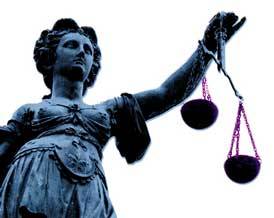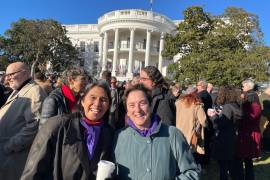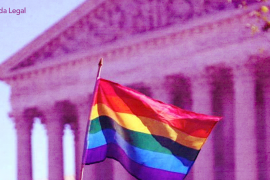
Standing Up to Judicial Bullies: A Profile in Courage
Blog Search
“Ask not what your country can do for you. Ask what you can do for your country.” These words, delivered by John F. Kennedy in his inaugural address, challenged the people of this nation to commit themselves to the public good, serving as a call for civic action.
Yesterday afternoon, on what would have been President Kennedy’s 95th birthday, the John F. Kennedy Profile in Courage Award was presented to three members of the Iowa Supreme Court who ruled unanimously in favor of marriage equality, only to be ousted the following year by a well-funded campaign orchestrated by antigay groups in what was supposed to be a pro forma retention election.
This ideological attack on individual judges for a single ruling stemmed from a case that Lambda Legal filed in 2005 on behalf of six same-sex couples who were denied marriage licenses in Iowa. The case, Varnum v. Brien, finally made it before the Iowa Supreme Court, where the justices unanimously recognized that the state’s exclusion of same-sex couples from the institution of marriage was at odds with the guarantee of Equal Protection in Iowa’s Constitution. In 2009, at the time of the ruling, Iowa was only one of a few states in the nation that recognized the equal right to marry.
The brave leadership and fierce judicial independence demonstrated by Chief Justice Ternus, Justice Streit and Justice Baker exemplify judicial integrity—a commitment to the rule of law that holds firm in the face of shifting political winds and the tide of public opinion. This firm dedication to the duty to uphold the constitution is reflected in the following passage from the Varnum decision:
In the final analysis, we give respect to the views of all Iowans on the issue of same-sex marriage—religious or otherwise—by giving respect to our constitutional principles. These principles require that the state recognize both opposite-sex and same-sex civil marriage… This result is what our constitution requires.
In today’s environment, with spending on judicial races at unprecedented levels and many state judges scrambling to add money to their campaign coffers, it is often easy to blur the line between justice and politics. However, unlike the legislative and executive branches, which are accountable to public demand, the judiciary is independent, and judges commit themselves to applying constitutional and legal principals, not personal policy preferences.
The attempt to bully the bench in the 2010 Iowa retention elections was intended to have broad implications for judges across the nation, and the message delivered by these single-issue groups was clear: “Rule against us, and you will be next.”
Today, Americans must again answer the call to civic action and push back against the misinformation campaign that seeks to confuse voters and abuse the judicial election and retention process. As concerned citizens, we must preserve judicial independence because, quite simply, judges and courts matter.
Judges decide cases that impact every aspect of our lives, from health care and immigration to marriage equality. Judges are charged with safeguarding our civil rights, and the cost of politicizing the judiciary is great. A fair and impartial judiciary, composed of dedicated public servants made in the mold of those honored with the Profiles in Courage Award, inspire public confidence in the integrity of our courts.
This year, voters in Iowa will again head to the polls to cast their votes in another retention election. Voters in several other states across the nation will also vote in judicial elections with similar well-funded single-issue campaigns. The best way to recognize the extraordinary service of the three Iowa justices and honor the proud legacy of civic action inspired by President Kennedy is to ensure that what happened in Iowa in 2010 never happens again.




